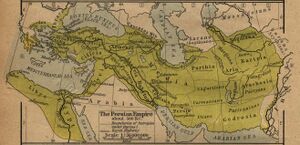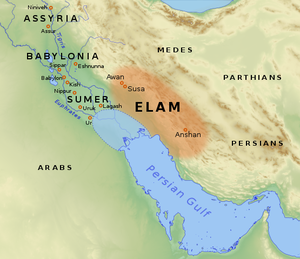Cossaea
| Author: Laxman Burdak, IFS (R). |


Cossaea was a district on the north-east of Susiana. Cossaei (Κοσσαῖοι) were a warlike tribe inhabiting this mountainous district of Cossaea , on the borders of Susiana to the south, and of Media Magna to the north.
Contents
Variants of name
- Cossaeans (Anabasis by Arrian, p. 398, 414.)
- Cossaea (Greek:Κοσσαία)
- Cossaei (Κοσσαῖοι)
- Cossaeans (Arrian)
- Cussii (Pliny the Elder)
- Cissii
- Cossiei (Pliny.vi.31)
Jat Gotras Namesake
- Kojhal = Cossiei (Pliny.vi.31)
- Kosar = Cossiei (Pliny.vi.31)
Jat Gotras Namesake
- Kojhal = Cossaeans (Anabasis by Arrian, p. 398, 414.)
- Kosar = Cossaeans (Anabasis by Arrian, p. 398, 414.)
History
They were a hill tribe, and were armed with bows and arrows. Their land was sterile and unproductive, and they lived the life of robbers. Strabo speaks of them as constantly at war with their neighbours, and testifies to their power when he says that they sent 13,000 men to assist the Elymaei in a war against the people of Babylonia and Susiana.[1] Alexander led his forces against them and subdued them, at least for a time.[2] The Persian kings had never been able to reduce them, but had been in the habit of paying them a tribute, when they moved their court annually from Ecbatana to Babylon, to pass their winter at the latter place.[3] In character, they seem to have resembled the Bakhtiari tribes, who now roam over the same mountains which they formerly occupied.
There is some variety in the orthography of their name in ancient authors. Pliny the Elder calls them Cussii, and in some places they are apparently confounded with the Cissii.[4] It is possible that their name may be connected with the modern Khuzistan.
Mention by Pliny
Pliny[5] mentions Tigris....Near the spot where the fleet of Alexander came up37 the Pasitigris to Susa, there is a village situate on the Chaldæan Lake, Aple by name, from which to Susa is a distance of sixty miles and a half. Adjoining to the people of Susiane, on the east, are the Cossiei38; and above them, to the north, is Mesabatene, lying at the foot of Mount Cambalidus,39 a branch of the Caucasian chain: from this point the country of the Bactri is most accessible.
37 As mentioned in c. 26 of the present Book,
38 A warlike tribe on the borders of Susiana and the Greater Media. In character they are thought to have resembled the Bakhtiara tribes, who now roam over the mountains which they formerly inhabited. It has been suggested that their name may possibly be connected with the modern Khuzistan.
39 Supposed to be the same as the modern Kirmánshah mountains.
Ch.15 Subjugation of the Cossaeans — Embassies from Distant Nations
Arrian[6] writes....The mourning was prolonged for many days; and as he was now beginning to recall himself from it, under such circumstances his Companions had less difficulty in rousing him to action. Then at length he made an expedition against the Cossaeans,[1] a warlike race bordering on the territory of the Uxians. They are mountaineers, inhabiting strong positions in separate villages. Whenever a force approached them, they were in the habit of retiring to the summits of their mountains, either in a body or separately as each man found it practicable; and thus they escaped, making it difficult for those who attacked them with their forces to come near them. After the enemy's departure, they used to turn themselves again to marauding, by which occupation they supported themselves. But Alexander subdued this race, though he marched against them in the winter; for neither winter nor ruggedness of ground was any impediment either to him or to Ptolemy, son of Lagus, who led a part of the army in the campaign against them. Thus no military enterprise which Alexander undertook was ever unsuccessful. As he was marching back to Babylon, he was met by embassies from the Libyans, who congratulated him and crowned him as conqueror of the kingdom of Asia.[2] From Italy also came Bruttians, Lucanians, and Tyrrhenians[3] as envoys, for the same purpose. The Carthaginians are said to have sent an embassy to him at this time[4]; and it is also asserted that envoys came to request his friendship from the Ethiopians, the Scythians of Europe, the Gauls, and Iberians—nations whose names were heard and their accoutrements seen then for the first time by Greeks and Macedonians. They are also said to have entrusted to Alexander the duty of settling their disputes with each other. Then indeed it was especially evident both to himself and to those about him that he was lord of all the land and sea.[5] Of the men who have written the history of Alexander, Aristus and Asclepiades[6] alone say that the Romans also sent an embassy to him, and that when he met their embassy, he predicted something of the future power of Rome, observing both the attire of the men, their love of labour, and their devotion to freedom. At the same time he made urgent inquiries about their political constitution. This incident I have recorded neither as certainly authentic nor as altogether incredible; but none of the Roman writers have made any mention of this embassy having been despatched to Alexander; nor of those who have written an account of Alexander's actions, has either Ptolemy, son of Lagus, or Aristobulus mentioned it. With these authors I am generally inclined to agree. Nor does it seem likely that the Roman republic, which was at that time remarkable for its love of liberty, would send an embassy to a foreign king, especially to a place so far away from their own land, when they were not compelled to do so by fear or any hope of advantage, being possessed as they were beyond any other people by hatred to the very nanie and race of despots.[7]
1. Cossaea was a district on the north-east of Susiana, which the Persian kings never subdued, but purchased the quiet of the inhabitants by paying them tribute. It is supposed to be the Cush of the Old Testament. Diodorus (xvii. Ill) says that Alexander completed his conquest of the Cossaeans in forty days. Plutarch (Alex. 72} says he called the massacre of the Cossaeans his offering to the manes of Hephaestion.
2. Cf. Livy, Tii. 37, 38; Pliny, xxii. 4; Justin, xii. 13.
3. The Romans called these people Etruscans.
4. Justin (xxi. 6) says that the Carthaginians sent Hamiloar to learn Alexander's real designs against them, under the pretence of being an exile ofiering his services.
5. Cf. Diodorus, xvii. 113.
6. Aristus was a man of Salamis in Cyprus. Neither his work nor that of Asclepiades is extant. Aristus is mentioned by Athenaeus (x. 10) and Strabo (lib. xv.).
7. Livy (ix. 18) says he does not think the contemporary Romans even knew Alexander by report.
References
- ↑ Strab. xi.
- ↑ Diod. xvii. 111.
- ↑ Strab. xi.
- ↑ Plin., H. N., vi. 27. s. 31.
- ↑ Natural History by Pliny Book VI/Chapter 31
- ↑ The Anabasis of Alexander/7b, Ch.15
Back to Jat Places in Iran